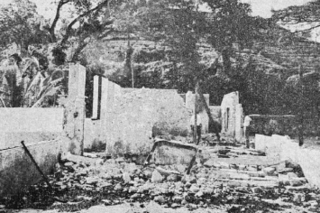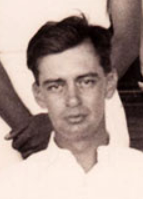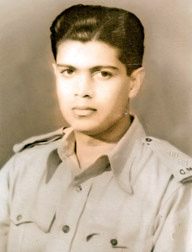
The 1971 Janatha Vimukthi Peramuna (JVP) insurrection was the first of two unsuccessful armed revolts conducted by the communist Janatha Vimukthi Peramuna (JVP) against the socialist United Front Government of Sri Lanka under Prime Minister Sirimavo Bandaranaike. The revolt began on 5 April 1971 and lasted until June of that year. The insurgents held towns and rural areas for several weeks, until the regions were recaptured by the armed forces, following strong support from friendly nations that sent men and material. Although this first attempt to seize power was quickly crushed by force, in 1987 the JVP launched a low-intensity insurgency in the island's southern, central and western regions that lasted several years.

Colonel Frederick Cecil "Derek" de Saram, OBE, ED was a Sri Lankan lawyer, a Ceylon cricket captain, and an officer of the Ceylon Army. He led the attempted military coup of 1962.

Sri Lanka Police is the civilian national police force of the Democratic Socialist Republic of Sri Lanka. The police force is responsible for enforcing criminal and traffic law, enhancing public safety, maintaining order and keeping the peace throughout Sri Lanka. The police force consists of 43 Territorial Divisions, 67 Functional Divisions, 432 Police Stations with more than 84,000 people. The professional head of the police is the Inspector General of Police who reports to the Minister of Law and Order as well as the National Police Commission. The current Inspector General of Police (Acting) is Deshabandu Tennakoon.
The 1962 Ceylonese coup d'état attempt was a failed military coup d'état planned in Ceylon. A group of Christian officers in the military and police planned to topple the government of Prime Minister Sirimavo Bandaranaike during the night of 27 January 1962. Organised by Colonel F. C. de Saram, Colonel Maurice De Mel,, Rear Admiral Royce de Mel, C.C. Dissanayake, Sydney de Zoysa and Douglas Liyanage, it was to take place in the night of 27 January 1962, but was called off as the government gained information in the afternoon and initiated arrests of the suspected coup leaders before the coup was carried out.

General Tissa Indraka Weeratunga, VSV was a Sri Lankan general. He was the former Commander of the Sri Lankan Army and the first General Officer Commanding (GOC) of the Joint Operations Headquarters (JOH), he was later Sri Lanka's High Commissioner to Canada.
Cyril Cyrus "Jungle" Dissanayake, MVO was a Sri Lankan senior police officer. He was serving as Deputy Inspector-General of Police of Range I, when he was implicated as one of the leaders of the attempted military coup of 1962.
Admiral Deshamanya D. Basil Gunasekara was the Commander of the Sri Lanka Navy from 1973 to 1979.
Sydney Godfrey de Zoysa was a Sri Lankan senior police officer. A former Deputy Inspector General of Police (DIG) of Range II and Permanent Secretary to the Ministry of Internal Security, he was one of co-conspirators of the attempted military coup of 1962.

Ganegoda Appuhamelage Don Edmund Ananda Seneviratne was a Sri Lankan police officer. He was the former Inspector-General of Police, Sri Lankan High Commissioner to Malaysia, former adviser to Cabinet Minister of National Security and ex member Public Service Commission of Sri Lanka.
Deshamanya L. D. Cyril Herath was a Sri Lankan Inspector-General of Police and Permanent Secretary to the Ministry of Defence.
The 1966 alleged Ceylonese coup d'état attempt was an alleged military coup planned in Sri Lanka (Ceylon). The commander of the army and several military personnel were arrested. They were later acquitted of a plot to overthrow the legally elected government.

Lieutenant Colonel Dr. Anthony St. Clare Rex de Costa, MBE, CAVF was a renowned Sri Lankan medical doctor and soldier. He was the commanding officer of the Ruhunu Regiment, a doctor in the Ceylon Defence Force during World War II and a vice president of the World Veterans Federation. He was assassinated by the JVP during the 1971 Insurrection.

General L. D. E. Cecil Waidyaratne, VSV, USP was a Sri Lanka Army general. He was 12th Commander of the Sri Lankan Army and a former Sri Lankan Ambassador to Thailand.
Santiago Wilson Osmund De Silva was Ceylonese police officer. He was the thirteenth and the first Ceylonese career police officer to become Inspector-General of Police (1955–1959).

Don Stanley Ernest Perera Rajapakse Senanayake was the 18th Inspector General of the Sri Lanka Police (IGP) (1970–1978). Senanayake is the second longest serving IGP, after Sir Herbert Dowbiggin, remaining in the position for seven years.
Morawakkorakoralege Walter Fonseka Abeykoon was a Ceylonese civil servant and served as the Inspector General of Police between 1959 and 1963.
John Wilhelmus Lucius Attygalle (1906–1981) was the 16th Inspector General of the Sri Lanka Police (IGP) (1966–1967).
The Government of Sri Lanka maintains intelligence agencies that conduct intelligence activities to support the national security of Sri Lanka. Their intelligence assessments contribute to the conduct of national security, military planning and law enforcement. The main organisations are the State Intelligence Service and the Directorate of Military Intelligence. These intelligence agencies are coordinated by the Chief of National Intelligence (CNI), who reports to the Secretary of Defense.
Aleric Lanty Abeygunawardena (1905-1998) was a Sri Lankan Inspector General Police (IGP) (1967–1970).
Major General Hikkaduwage Gratian Silva, VSV, FBIM was a Sri Lankan military leader, he served as the Military Secretary.